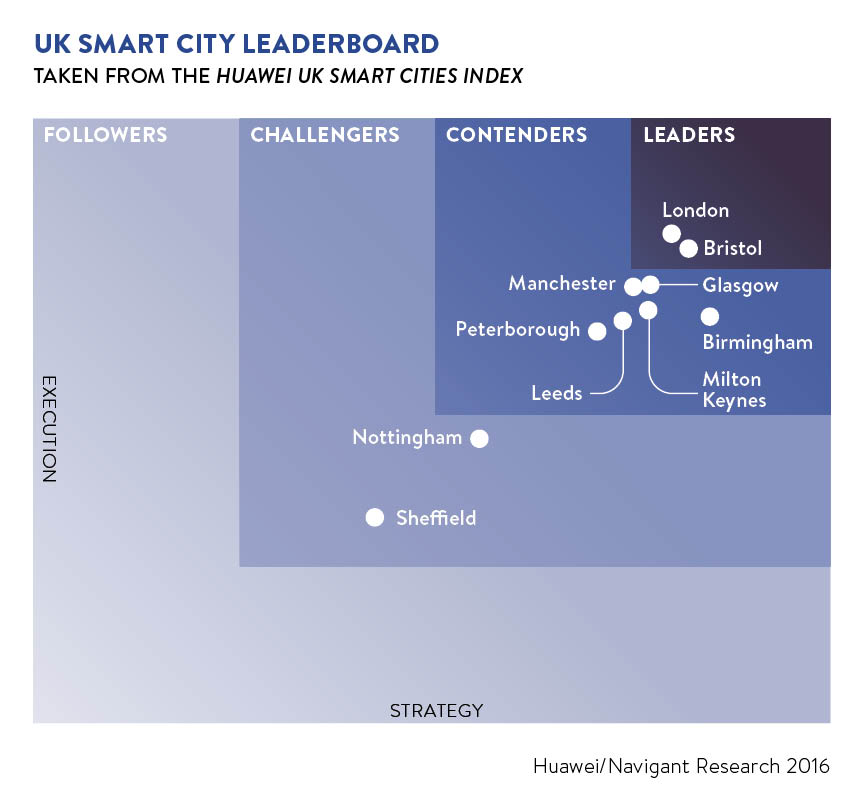If there is one city in the UK that you do not want to be up against for an award, it is probably Bristol. The shipshape star of the South West seems to have been collecting trophies and funding almost for fun over the last five years.
In the first-ever Huawei UK Smart Cities Index launched this year, Bristol was identified as a leader, ranked second only to London. Variously described as Britain’s fastest-growing and most efficient city, Bristol was the European Green Capital for 2015 and declared Britain’s best city to live in by The Sunday Times in 2014. It was also allocated £11.3 million from the UK Urban Broadband Fund, as one of ten super-connected cities in 2012.
Bristol has a population of nearly half a million and a relatively young demographic, with more under-16s than pensioners. Famous for its maritime history and the engineering of Brunel, it boasts a strong academic pedigree, plus cultural attractions such as the Bristol Old Vic theatre.
In last year’s Prosperity Map, Bristol was the fifth most affluent city in the UK and third most expensive place to buy a house, fuelling rising concerns about gentrification.
City realities
However, to picture Bristol simply as a property hotspot for the well heeled and better educated would be to misrepresent and misunderstand this complicated and modern metropolis.
Bristol is a city of extremes, with 16 per cent of inhabitants resident in the most deprived areas in England. This complexity and diversity makes the smart city challenge that bit bigger and a spirit of togetherness even more important, says Stephen Hilton, director of Bristol Futures Global.
“When it comes to smart cities, Bristol is certainly ahead of the pack, but the city doesn’t want to become a smart island, disconnected from the surrounding region, or a place where citizens and communities are disconnected from each other,” he says.
Accordingly, director of Knowle West Media Centre (KWMC) Carolyn Hassan sees the city leading on people-centric thinking. “Bristol is really contributing to a growing movement globally that puts people before technology, or harnesses technology and its transformative power to think about how we provide for all citizens, their individuality and rich, diverse cultures,” she says.
A pioneering arts organisation and charity, KWMC supports individuals and communities to get the most out of digital technologies. It is situated in the Knowle West area of Bristol, one of the most economically deprived. Advocating a sharing and collaborative model, it champions Citizen Sensing for inclusive community-driven digital projects involving sensor technologies. This approach puts people and social needs first, tackling issues affecting health, education and quality of life.
The sustainable purpose-built home of KWMC is itself an award-winning example of straw-bale construction, pioneered by local architects White Design. The same Bristol-based practice is currently collaborating with KWMC on smart solutions to the local housing crisis, says founding director Craig White.
“We are working on the Made in Bristol Home (MiBH). KWMC has brought digital to an area of deprivation and transformed how the community thinks of itself and acts. The MiBH combines the physical, digital and societal to imagine how that community can now become the developer of the homes it needs,” he says.

Empowering innovation
Integration of digital technology as an enabling and empowering force at community level can also be seen supporting city targets on energy and climate change. According to councillor Martin Fodor, of Bristol Green Party, the emerging smart agenda will be essential to ambitions for a carbon neutral city by 2050.
“There are dozens of grassroots groups in the city engaged with a community-led energy agenda. Combined with a thriving social enterprise sector, we have seen a range of creative energy projects, like neighbourhood infrared (IR) surveys mashed into street view images using secondhand iPhones and an IR sleeve, programmed in someone’s home.”
This is a city-scale testbed on which we have the opportunity to place and try technologies – hardware and software
The platform underpinning all these cross-sector projects is, of course, the digital ecosystem of smart city infrastructure. For Mr Hilton, who a decade ago first established and led the city’s digital partnership Connecting Bristol, certain smart technology choices paved the way for where Bristol is today.
“The city council buying a duct network to rollout dark fibre was very significant. Bandwidth became a utility rather than a commodity and the cost of experimenting with digital massively reduced. The city wouldn’t now be experimenting with the internet of things if the connectivity wasn’t already there,” he points out.
City-wide experimentation
Experimentation is the lifeblood of Bristol is Open, a joint venture between the University of Bristol and Bristol City Council to develop an open and programmable city.
Bristol University professor of high performance networks and chief technology officer of Bristol is Open Dimitra Simeonidou sees their work building on former mayor George Ferguson’s vision of Bristol as a laboratory for change. “Bristol is Open is quite unique. This is not a smart city, it is a city-scale testbed on which we have the opportunity to place and try technologies – hardware and software,” she says.
As evidence of this ability to experiment, the city has already developed 5G equipment and been trialling services long before chancellor Philip Hammond broke the news in his Autumn Statement.
This openness to experimentation at city-scale is attracting interest from private sector companies, with startups and big corporations alike choosing Bristol as a playground for trialling technologies. The ultimate vision going forward, though, is one of a programmable, equitable city, concludes Professor Simeonidou.
“Here at Bristol, we have committed to this whole notion of programmability,” he says. “This means that the city should actually work in the end for the citizens. What I should like is for the citizens to be able to design services that suit themselves and the community, completely democratising the smart city.”
In this Bristol of tomorrow, we are all winners.
City realities

